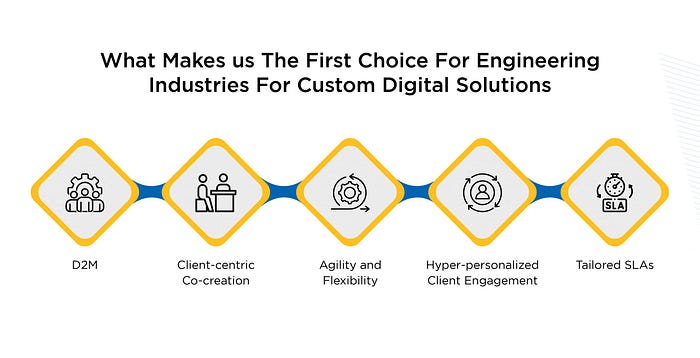The Hidden Formula for Skyrocketing Revenue by 35% in Large Engineering Firms 💰
The evolution of engineering industries hinges on embracing digital transformation amidst market shifts and technological advancements.
As Industry 4.0 unfolds, integrating advanced technologies into legacy IT infrastructure becomes imperative for manufacturers, engineering firms, and service providers.
This shift towards digitization promises enhanced automation, efficiency gains, cost reductions, and improved product quality, all essential for maintaining competitiveness in a rapidly evolving landscape.
Top Challenges Faced by Engineering Industries
Daily operations in engineering industries are fraught with challenges such as transit-cycle management, shift scheduling, quality control, and resource allocation.
These challenges underscore the necessity for custom digital solutions that can boost productivity and revenue by 35–40%. Understanding the impact of outdated IT infrastructure and ERP systems on these industries is crucial.
Impact of Outdated IT Infrastructure
Legacy IT infrastructure, though familiar, poses significant challenges in today’s dynamic technological environment:
Growth Constraints:
Limited Scalability: 87% of engineering firms experience project delays due to scalability limitations.
Innovation Barriers: Modern data analytics tools can boost innovation success rates by 20%, hindered by legacy systems.
Productivity Challenges:
Inefficiencies: Manual data entry errors from legacy systems cost up to 10% in productivity losses.
Collaboration Issues: Siloed data reduces team collaboration efficiency by 33%.
ROI Implications:
Increased Costs: Up to 80% of IT budgets are consumed by legacy system maintenance.
Security Risks: Vulnerabilities in outdated systems contribute to significant data breach costs.
Ace Infoway’s Custom Digital Solutions

Ace Infoway addresses these challenges with tailored digital solutions designed to strengthen legacy IT infrastructure:
1. Infrastructure Assessment and Strategic Planning: Comprehensive assessment and roadmap for modernization.
Benefits: 30–35% operational inefficiency reduction, 20–25% lower maintenance costs, 25–30% system performance improvement.
2. Cloud Computing Solutions: Migration to cloud platforms like AWS, Azure, or Google Cloud for enhanced scalability and resilience.
Benefits: 30–40% reduced infrastructure costs, 35% improved scalability, and faster time-to-market for applications.
3. AI/ML Integration: Leveraging AI/ML for predictive maintenance, process optimization, and enhanced decision-making.
Benefits: 25–30% operational efficiency increase, 30–35% lower maintenance costs, and improved product quality.
4. Product Engineering Services: Custom software solutions to improve productivity and user experience.
Benefits: 30% operational efficiency improvement, 25–30% better user experience, and reduced development costs.
5. Security and Compliance: Implementing advanced security measures and ensuring regulatory compliance.
Benefits: 60% reduction in security breaches, improved data protection.
Why Team Up with Ace Infoway?
Direct Management Engagement: Ensures top-notch service and timely project delivery.
Client-centric Approach: Co-creating solutions that align with client goals.
Agility and Flexibility: Swift adaptation to evolving business landscapes.
Personalized Engagement: Tailoring services to meet unique client needs.
Tailored SLAs: Adapting service agreements to business objectives and risk management strategies.
Contact us at https://www.aceinfoway.com/contact-us to speak directly with our leadership team and discover how Ace Infoway can propel your business forward in the digital age.
Conclusion
The engineering industry’s journey toward modernization and digital transformation is imperative for leveraging resources efficiently and driving growth. Ace Infoway offers specialized digital solutions to seamlessly integrate with existing systems, facilitate cloud migration, and modernize legacy IT infrastructure, ensuring engineering companies stay competitive and innovative in today’s evolving landscape.
